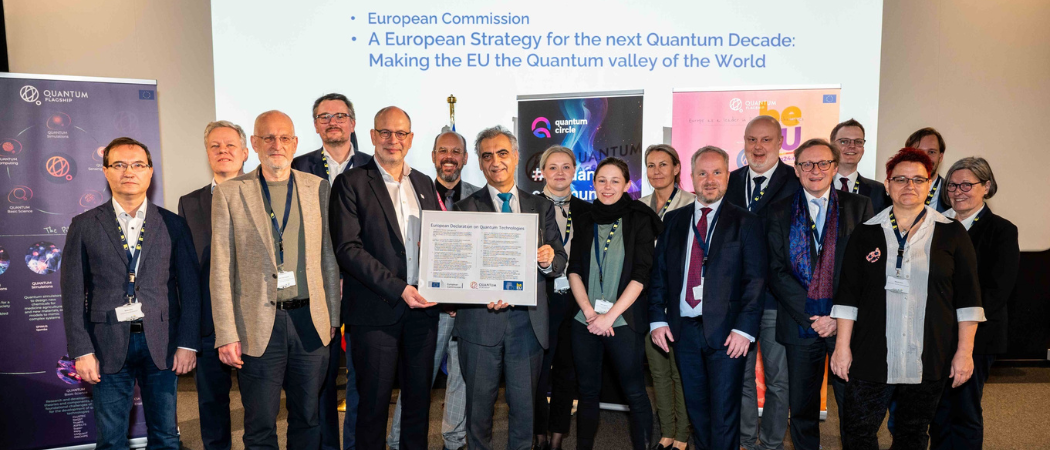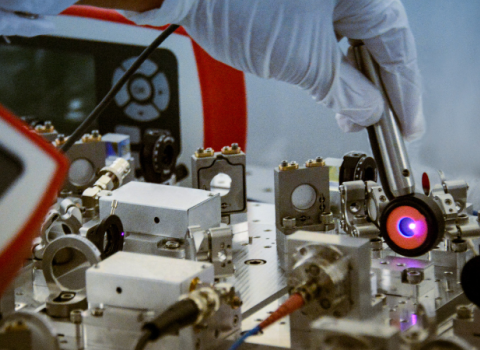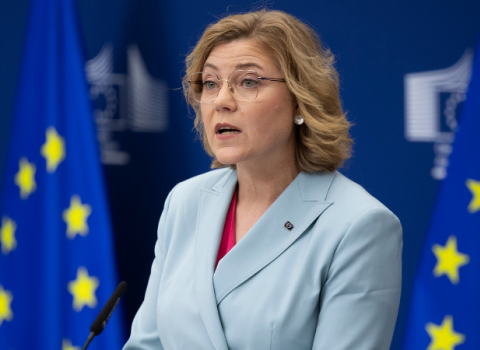Call for more corporate investment in applying quantum technologies, as member states step up collaboration efforts

Members of the European Commission and delegates from member states celebrate the signature of the European Declaration on Quantum Technologies at the ‘Shaping Europe’s Quantum Future’ conference. Michael Chia / Quantum Flagship
The EU needs a “new strategic approach” to quantum technologies if it is to become the ‘quantum valley’ of the world, Thomas Skordas, deputy director general for DG Connect in the Commission, said as he called on the private sector to invest more in translating emerging science into applications.
“Quantum has the potential to transform many sectors: medicine, energy, computing and communications, climate and weather modelling, cybersecurity, space, defence and more,” he said. “It will enable huge productivity gains, revitalise industry, and open up new markets, applications and job opportunities.”
Europe is home to more than 120 quantum start-ups, a similar number to the US, but more private investment is needed to help them to grow, Skordas said.
“In other regions, large industry is investing much more in quantum than our own major industrial players do. Even though we have a quarter of all quantum SMEs globally, they have attracted only 5% of global funding,” he said.
The Commission is currently finalising a risk assessment of quantum technologies with member states. This has highlighted additional areas of concern, such as “the fragmentation of our efforts, the need to attract more talent, and overreliance on non-EU suppliers for some critical components and raw materials,” said Skordas.
Skordas was standing in for Thierry Breton, commissioner for the internal market, at an event organised by the Belgian EU presidency last Friday to celebrate the signing of the European declaration on quantum technologies.
In all, 21 member states have signed the pact, first launched in December, committing to collaborate work together and with the Commission, to make Europe a world leader in quantum innovation.
Several initiatives are underway at national and EU levels. In 2018, the EU launched the Quantum Technologies Flagship, a ten-year, €1 billion initiative to support research and bring results closer to industrial exploitation. Since 2018, the EU and member states have committed more than €8 billion to quantum technologies.
Collective action
The first pillar of the EU’s strategy is to support start-ups and SMEs in scaling up, which will require an increase in both public and private investments. “We need collective action to ensure that large companies are aware of the potential of quantum,” Skordas said.
“Several member states are also committing major investments, also supported by the Recovery and Resilience Facility, but I would urge them to do so even more ambitiously.”
The EU can also contribute by building pan-European quantum infrastructures, to create a “lead market” for companies. As part of the European High Performance Computing joint undertaking, it aims to have its first supercomputer with quantum acceleration by 2025.
“We will make this infrastructure available to users anywhere in Europe, and this will create a strong community ready to use this computing capacity to train large AI models, and develop new applications,” Skordas said.
All 27 member states have agreed to work together to develop secure quantum communications, as part of the European Quantum Communication Infrastructure (EuroQCI), which aims to safeguard sensitive data and critical infrastructures.
Another key pillar of the strategy is increasing cooperation between member states on basic research, which will also require a focus on talent. The EU will set up a quantum skills academy, to support the development of master’s degrees across Europe.
The EU aims for collaboration across the bloc, and also with likeminded countries, and has funded joint research with Canada and is cooperating on quantum with Japan, South Korea and the US.
“Our cooperation agreements will be based on reciprocity, fair sharing of intellectual property, and open access to critical technologies,” Skordas said.
Frank Monteny, director general for research and space at the Belgian Science Policy Office, said quantum technologies have “the potential to revolutionise our understanding of the world around us”.
Quantum computing could solve complex problems beyond the reach of classical computers, while quantum sensing and metrology allow for more precise measurements and observations, with the potential to enable earlier detection of disease and improve environmental monitoring.
The Belgium Quantum Circle, an initiative which aims to bring together Belgian researchers, industry and the public and private sectors to further innovation in quantum technologies, was launched at the conference. The first step will be to educate the local market about quantum’s potential.
“There’s a lot of activity going on in Belgian universities, research centres,” said quantum ecosystem manager Jan Sonck. “But what we learned as well is that, in corporates, in terms of exploration of quantum possibilities, there is not a lot happening yet. We couldn’t identify ten corporate organisations active in quantum […] and there are not more than five start-ups active in Belgium today.”





 A unique international forum for public research organisations and companies to connect their external engagement with strategic interests around their R&D system.
A unique international forum for public research organisations and companies to connect their external engagement with strategic interests around their R&D system.